-
 Bitcoin
Bitcoin $83,407.2371
-1.63% -
 Ethereum
Ethereum $1,823.1395
-3.06% -
 Tether USDt
Tether USDt $0.9997
-0.02% -
 XRP
XRP $2.0473
-2.23% -
 BNB
BNB $600.1100
-0.49% -
 Solana
Solana $119.7021
-3.88% -
 USDC
USDC $0.9998
-0.01% -
 Dogecoin
Dogecoin $0.1648
-3.39% -
 Cardano
Cardano $0.6519
-2.39% -
 TRON
TRON $0.2368
-0.66% -
 Toncoin
Toncoin $3.8129
-4.99% -
 UNUS SED LEO
UNUS SED LEO $9.3898
-0.23% -
 Chainlink
Chainlink $13.1549
-4.15% -
 Stellar
Stellar $0.2637
-1.07% -
 Sui
Sui $2.4035
1.65% -
 Avalanche
Avalanche $18.5674
-3.45% -
 Shiba Inu
Shiba Inu $0.0...01232
-0.30% -
 Hedera
Hedera $0.1654
0.03% -
 Polkadot
Polkadot $4.0578
-0.51% -
 Litecoin
Litecoin $82.9613
0.22% -
 MANTRA
MANTRA $6.3104
1.76% -
 Bitcoin Cash
Bitcoin Cash $301.4958
-1.14% -
 Bitget Token
Bitget Token $4.5444
-0.98% -
 Dai
Dai $0.9999
-0.01% -
 Ethena USDe
Ethena USDe $1.0000
0.02% -
 Pi
Pi $0.6681
-3.26% -
 Hyperliquid
Hyperliquid $12.3441
-5.68% -
 Monero
Monero $216.6690
-0.88% -
 Uniswap
Uniswap $5.9832
-2.69% -
 Aptos
Aptos $5.2233
-0.17%
What role does "timestamp" of blockchain play in the system?
Timestamps in blockchain ensure transaction order, immutability, and security, crucial for consensus, auditability, and smart contract execution.
Mar 30, 2025 at 05:36 am
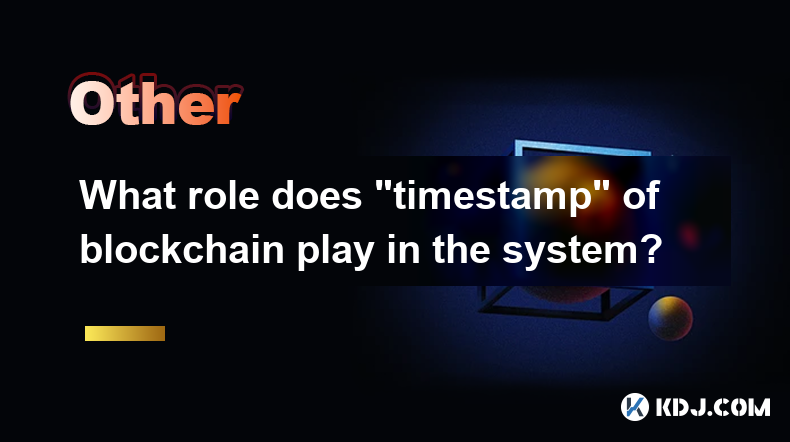
The Crucial Role of Timestamps in Blockchain Technology
The timestamp in a blockchain is far more than a simple date and time stamp; it's a fundamental element ensuring the integrity and security of the entire system. It acts as a crucial piece of metadata, inextricably linked to each block, providing a verifiable record of when a transaction occurred. This seemingly simple element plays a vital role in several key aspects of blockchain functionality.
One primary function is to establish chronological order. Each block contains a timestamp indicating its creation time. Because blocks are chained together cryptographically, altering the timestamp of a single block would require altering the hash of that block, and consequently, the hash of all subsequent blocks. This makes manipulating the order of transactions incredibly difficult and computationally expensive, effectively preventing fraudulent alterations of transaction history.
Furthermore, timestamps contribute significantly to the immutability of the blockchain. The immutability of the blockchain is a cornerstone of its security. By recording the exact time of each transaction, it becomes practically impossible to insert fraudulent transactions into the past. Any attempt to do so would be immediately detectable due to the discrepancies in the chronological sequence created by the timestamps.
Timestamps also play a critical role in consensus mechanisms. Many blockchain networks rely on consensus mechanisms, such as Proof-of-Work (PoW) or Proof-of-Stake (PoS), to validate transactions and add new blocks to the chain. These mechanisms often use timestamps to determine the order of transactions and to prevent double-spending attacks. The precise timestamp helps the network agree on the correct order of events.
The accuracy of timestamps is paramount. While the exact time might not be crucial in all applications, the relative order of transactions is. Slight variations in timestamps between nodes are acceptable, as long as the overall order remains consistent. Advanced techniques are employed to ensure synchronization and minimize discrepancies across the network. This is crucial for maintaining the integrity of the entire system.
Beyond the technical aspects, timestamps provide valuable auditability. The timestamped record of every transaction creates a transparent and auditable trail. This allows for easy verification of transactions and helps in resolving any disputes that may arise. The ability to pinpoint the exact time of a transaction is invaluable for regulatory compliance and forensic investigations.
The timestamp’s role extends to decentralized applications (dApps) built on blockchain technology. dApps rely on the blockchain's inherent security and immutability. The timestamp ensures the integrity of data used by these applications, providing a reliable foundation for their operation. This is crucial for various applications, including supply chain management, voting systems, and digital identity management.
Timestamp Accuracy and Security Measures
Maintaining the accuracy and security of timestamps is crucial. Several techniques are used to achieve this:
Network Synchronization: Blockchain nodes utilize network time protocols (NTP) to synchronize their clocks with a reliable time source, minimizing discrepancies between timestamps.
Median Timestamps: Instead of relying on a single node's timestamp, many blockchains use the median timestamp from multiple nodes to improve accuracy and resist manipulation.
Cryptographic Hashing: The timestamp is incorporated into the block's hash, ensuring its integrity. Any alteration to the timestamp would change the hash, making the alteration immediately apparent.
Proof-of-Work/Proof-of-Stake: Consensus mechanisms ensure the validity of blocks and their associated timestamps, preventing malicious actors from inserting blocks with manipulated timestamps.
Timestamps and Different Blockchain Architectures
The implementation of timestamps can vary slightly depending on the specific blockchain architecture. However, the fundamental role remains consistent across different systems. Some blockchains might use more sophisticated techniques for timestamping, ensuring higher accuracy and security. The underlying principle, however, always revolves around maintaining a verifiable and tamper-proof record of transaction timing.
Timestamps and Smart Contracts
Smart contracts, self-executing contracts with the terms of the agreement between buyer and seller being directly written into lines of code, rely heavily on timestamps for execution. Many smart contracts have conditions that are triggered based on specific times or durations. The accurate and reliable timestamps provided by the blockchain are essential for the correct and timely execution of these contracts. This timing element is often critical for financial applications, ensuring that payments are released or actions are taken at the predetermined time.
The precision of the timestamp is often a design consideration when building smart contracts. Some contracts might require millisecond accuracy, while others might only need second-level precision. The choice depends on the specific requirements of the contract.
Frequently Asked Questions
Q: Can timestamps be manipulated on a blockchain?
A: While theoretically possible, manipulating timestamps on a blockchain is extremely difficult and computationally expensive due to the cryptographic hashing and consensus mechanisms in place. Altering a single timestamp would necessitate altering the hash of that block and all subsequent blocks, requiring immense computational power and making detection almost certain.
Q: What happens if there's a significant time difference between nodes?
A: Significant time differences between nodes can lead to inconsistencies in the ordering of transactions. However, most blockchains employ mechanisms like median timestamping and network synchronization protocols to minimize these discrepancies. Consensus mechanisms help resolve conflicts and ensure the majority of nodes agree on the correct order.
Q: How do timestamps contribute to the security of blockchain?
A: Timestamps are crucial for the security of blockchain in several ways. They establish chronological order, contribute to immutability, are essential for consensus mechanisms, and provide auditability. They make it virtually impossible to insert fraudulent transactions into the past or alter the order of existing transactions.
Q: Are timestamps the only factor determining transaction order?
A: While timestamps provide a strong indication of transaction order, they are not the sole determining factor. Consensus mechanisms also play a significant role in establishing the order, especially when dealing with near-simultaneous transactions. The combination of timestamps and consensus ensures the integrity of the transaction order.
Q: What happens if a node's clock is significantly off?
A: If a node's clock is significantly off, its transactions might be rejected by other nodes. The consensus mechanism will ensure that only transactions with timestamps that are consistent with the majority of nodes are included in the blockchain. The node with the incorrect clock will need to synchronize its time with a reliable source to participate fully in the network.
Disclaimer:info@kdj.com
The information provided is not trading advice. kdj.com does not assume any responsibility for any investments made based on the information provided in this article. Cryptocurrencies are highly volatile and it is highly recommended that you invest with caution after thorough research!
If you believe that the content used on this website infringes your copyright, please contact us immediately (info@kdj.com) and we will delete it promptly.
- RUVI AI Revolutionizes AI Accessibility with Blockchain Power
- 2025-04-03 11:15:12
- Fidelity Investments Introduces an IRA That Permits Investors to Buy Bitcoin, Ether, and Litecoin
- 2025-04-03 11:15:12
- Whale Alert Detects a Large Bitcoin Transfer Involving 1050 BTC from Binance to an Unknown Wallet
- 2025-04-03 11:10:12
- Democratic Lawmakers Ask US Securities Regulator to Preserve Records of President Trump's Crypto Venture
- 2025-04-03 11:10:12
- Curve Finance Notches Record-Breaking Trading Volumes of Nearly $35 Billion in the First Quarter of 2025
- 2025-04-03 11:05:13
- Coinlist restarts US operations after five-year hiatus
- 2025-04-03 11:05:13
Related knowledge

What are the future development trends of blockchain game development?
Apr 03,2025 at 05:00am
Blockchain technology has revolutionized various industries, and gaming is no exception. As we look to the future, several trends are set to shape the development of blockchain games. These trends not only promise to enhance the gaming experience but also to integrate blockchain technology more seamlessly into the gaming ecosystem. Let's explore these t...

What are the money-making opportunities in the application of blockchain in the medical industry?
Apr 03,2025 at 03:35am
The integration of blockchain technology into the medical industry presents a myriad of money-making opportunities that can revolutionize healthcare systems. Blockchain's inherent characteristics, such as transparency, security, and immutability, make it an ideal solution for various medical applications. By leveraging blockchain, companies can develop ...
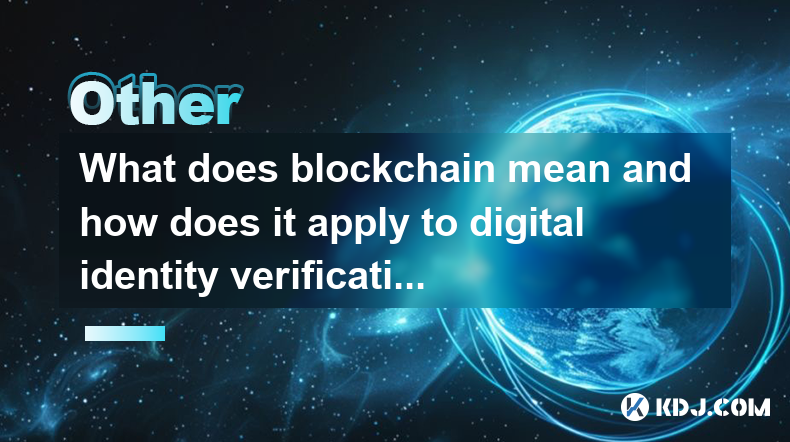
What does blockchain mean and how does it apply to digital identity verification?
Apr 03,2025 at 02:21am
Blockchain technology, at its core, is a decentralized and distributed digital ledger used to record transactions across numerous computers. This ensures that the recorded data cannot be altered retroactively without the alteration of all subsequent blocks and the consensus of the network. The concept of blockchain was initially devised for the digital ...
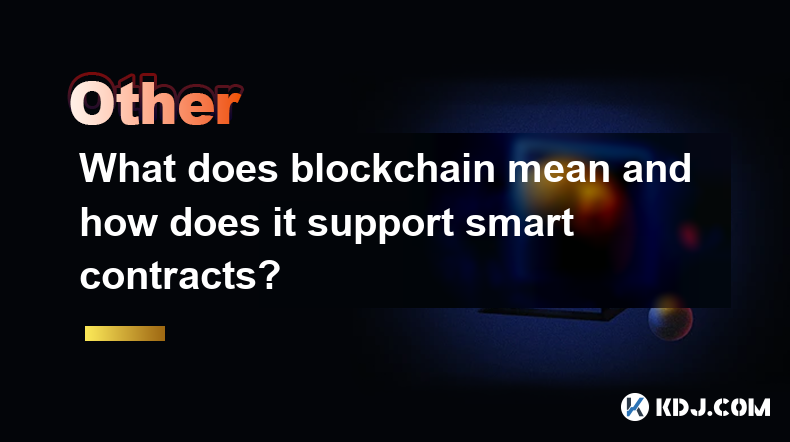
What does blockchain mean and how does it support smart contracts?
Apr 03,2025 at 02:28am
Blockchain technology is a decentralized, distributed ledger that records transactions across numerous computers. It ensures that once data is recorded, it cannot be altered retroactively without the alteration of all subsequent blocks and the consensus of the network. This technology is the backbone of cryptocurrencies like Bitcoin and Ethereum. Blockc...
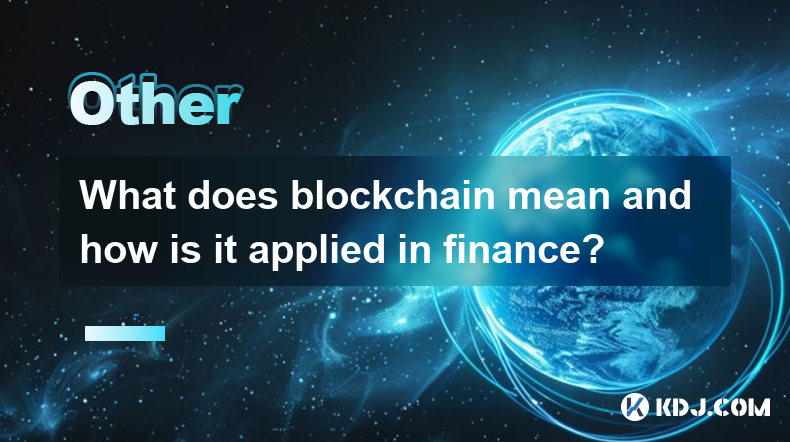
What does blockchain mean and how is it applied in finance?
Apr 03,2025 at 07:42am
Blockchain is a decentralized and distributed digital ledger used to record transactions across numerous computers. It ensures that each transaction is secure, transparent, and verifiable. The technology behind blockchain was initially developed to serve as the public transaction ledger for the cryptocurrency Bitcoin. However, its potential applications...
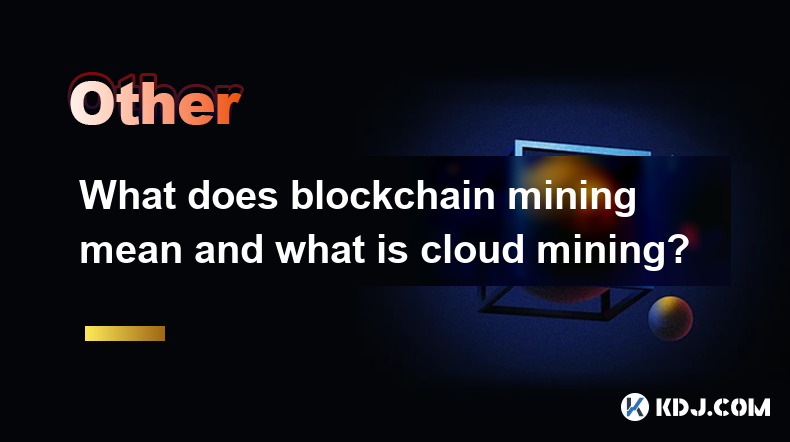
What does blockchain mining mean and what is cloud mining?
Apr 03,2025 at 02:01am
Blockchain mining is the process by which new transactions are verified and added to the blockchain ledger. It involves solving complex mathematical problems using computational power, which results in the creation of new cryptocurrency units as a reward. Miners compete to solve these problems, and the first one to find the solution gets to add a new bl...

What are the future development trends of blockchain game development?
Apr 03,2025 at 05:00am
Blockchain technology has revolutionized various industries, and gaming is no exception. As we look to the future, several trends are set to shape the development of blockchain games. These trends not only promise to enhance the gaming experience but also to integrate blockchain technology more seamlessly into the gaming ecosystem. Let's explore these t...

What are the money-making opportunities in the application of blockchain in the medical industry?
Apr 03,2025 at 03:35am
The integration of blockchain technology into the medical industry presents a myriad of money-making opportunities that can revolutionize healthcare systems. Blockchain's inherent characteristics, such as transparency, security, and immutability, make it an ideal solution for various medical applications. By leveraging blockchain, companies can develop ...

What does blockchain mean and how does it apply to digital identity verification?
Apr 03,2025 at 02:21am
Blockchain technology, at its core, is a decentralized and distributed digital ledger used to record transactions across numerous computers. This ensures that the recorded data cannot be altered retroactively without the alteration of all subsequent blocks and the consensus of the network. The concept of blockchain was initially devised for the digital ...

What does blockchain mean and how does it support smart contracts?
Apr 03,2025 at 02:28am
Blockchain technology is a decentralized, distributed ledger that records transactions across numerous computers. It ensures that once data is recorded, it cannot be altered retroactively without the alteration of all subsequent blocks and the consensus of the network. This technology is the backbone of cryptocurrencies like Bitcoin and Ethereum. Blockc...

What does blockchain mean and how is it applied in finance?
Apr 03,2025 at 07:42am
Blockchain is a decentralized and distributed digital ledger used to record transactions across numerous computers. It ensures that each transaction is secure, transparent, and verifiable. The technology behind blockchain was initially developed to serve as the public transaction ledger for the cryptocurrency Bitcoin. However, its potential applications...

What does blockchain mining mean and what is cloud mining?
Apr 03,2025 at 02:01am
Blockchain mining is the process by which new transactions are verified and added to the blockchain ledger. It involves solving complex mathematical problems using computational power, which results in the creation of new cryptocurrency units as a reward. Miners compete to solve these problems, and the first one to find the solution gets to add a new bl...
See all articles
























































































